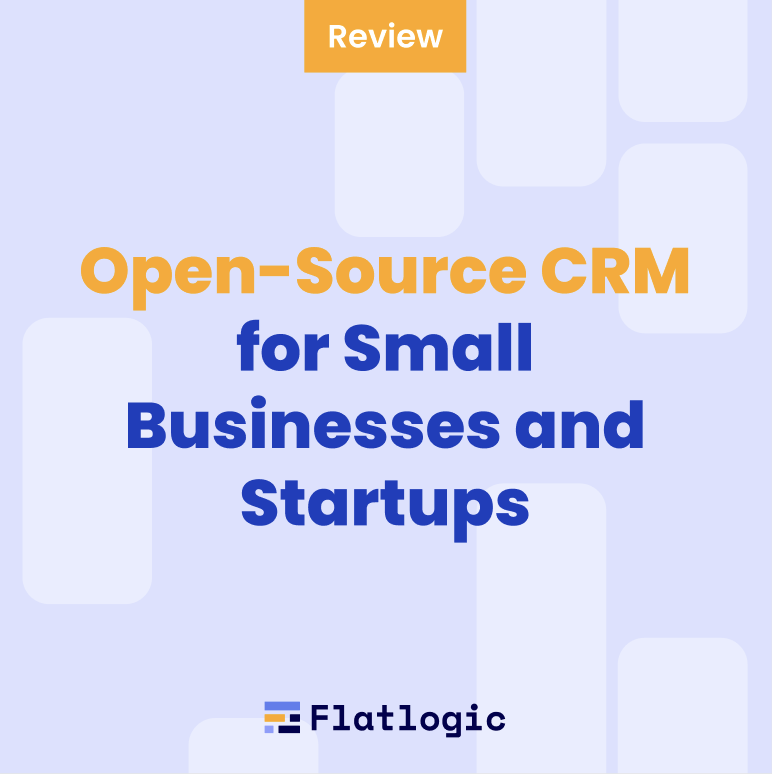
Open Source CRM: A Startup’s Secret Weapon for Growth
In the fast-paced and fiercely competitive world of startups, every decision can make or break the company. One area where startups can’t afford to cut corners is customer relationship management (CRM). A well-implemented CRM system can be a game-changer, helping startups build strong customer relationships, streamline sales processes, and drive growth. While proprietary CRM solutions like Salesforce and HubSpot dominate the market, open-source CRM software offers a compelling alternative for startups on a tight budget.
What is Open Source CRM?
Open source CRM is a type of CRM software where the source code is publicly available and can be freely modified, distributed, and used by anyone. This differs from proprietary CRM systems, where the vendor owns the code and users must pay licensing fees to access and use the software.
Benefits of Open Source CRM for Startups
-
Cost-Effectiveness: The most significant advantage of open-source CRM is its cost. Startups can save a substantial amount of money on licensing fees compared to proprietary solutions. While there may be costs associated with implementation, customization, and support, these are typically lower than the ongoing subscription fees of proprietary CRM systems.
-
Customization and Flexibility: Open source CRM offers unparalleled customization options. Startups can tailor the software to their specific needs and workflows, adding or removing features as required. This flexibility is particularly valuable for startups with unique business models or processes that don’t fit neatly into the standard offerings of proprietary CRM systems.
-
Scalability: As startups grow, their CRM needs will evolve. Open source CRM can easily scale to accommodate increasing data volumes, users, and business processes. Startups can add more resources, customize the software, and integrate it with other systems as needed.
-
Community Support: Open source CRM projects are typically supported by a vibrant community of developers, users, and experts. This community provides a valuable resource for startups seeking help with implementation, customization, or troubleshooting.
-
Data Ownership and Control: With open-source CRM, startups have complete control over their data. They can choose where to host the software and data, ensuring compliance with data privacy regulations and maintaining ownership of their customer information.
-
Integration Capabilities: Open source CRM systems often offer robust integration capabilities, allowing startups to connect them with other business applications such as accounting software, marketing automation tools, and e-commerce platforms.
Popular Open Source CRM Solutions for Startups
-
SuiteCRM: SuiteCRM is a popular open-source CRM platform known for its comprehensive features and customization options. It offers modules for sales, marketing, service, and project management, making it a versatile solution for startups.
-
vtiger CRM: vtiger CRM is another well-regarded open-source CRM system that provides a range of features, including sales automation, marketing automation, and customer support. It also offers a user-friendly interface and a mobile app for on-the-go access.
-
Odoo: Odoo is an open-source business management software suite that includes a CRM module. Odoo CRM is known for its modular design and extensive app store, allowing startups to add features and functionality as needed.
-
EspoCRM: EspoCRM is a modern open-source CRM system that focuses on simplicity and ease of use. It offers a clean interface, a range of features, and a REST API for integration with other systems.
Considerations When Choosing an Open Source CRM
-
Technical Expertise: Implementing and customizing open-source CRM requires technical expertise. Startups should have access to developers or IT professionals who can handle the installation, configuration, and maintenance of the software.
-
Implementation Costs: While open-source CRM is free to download and use, there may be costs associated with implementation, customization, and support. Startups should factor these costs into their budget when evaluating open-source CRM solutions.
-
Security: Security is a critical consideration for any CRM system. Startups should ensure that their open-source CRM is properly secured and that they have implemented appropriate security measures to protect customer data.
-
Support: While open-source CRM projects are typically supported by a community, the level of support may vary. Startups should evaluate the available support options and choose a CRM system with a robust community and documentation.
-
Future Development: Startups should consider the future development of the open-source CRM system. They should choose a CRM system that is actively maintained and has a clear roadmap for future development.
How to Implement Open Source CRM in Your Startup
-
Define Your Requirements: Before choosing an open-source CRM system, startups should clearly define their requirements. What features do they need? What integrations are required? What is their budget?
-
Evaluate Different Solutions: Once the requirements are defined, startups should evaluate different open-source CRM solutions. They should consider factors such as features, customization options, support, and security.
-
Plan the Implementation: Implementing open-source CRM requires careful planning. Startups should create a detailed implementation plan that includes timelines, responsibilities, and milestones.
-
Customize the Software: Open source CRM offers a high degree of customization. Startups should customize the software to their specific needs and workflows.
-
Train Your Team: Once the CRM system is implemented, startups should train their team on how to use it effectively.
-
Monitor and Optimize: After implementation, startups should monitor the performance of the CRM system and make adjustments as needed.
Conclusion
Open source CRM offers a compelling alternative to proprietary solutions for startups. It provides cost-effectiveness, customization, scalability, and community support. By carefully evaluating their needs and choosing the right solution, startups can leverage open-source CRM to build strong customer relationships, streamline sales processes, and drive growth. While implementing and customizing open-source CRM requires technical expertise, the benefits can be significant for startups on a tight budget.
With the right open source CRM in place, startups can gain a competitive edge, build a loyal customer base, and pave the way for long-term success.

